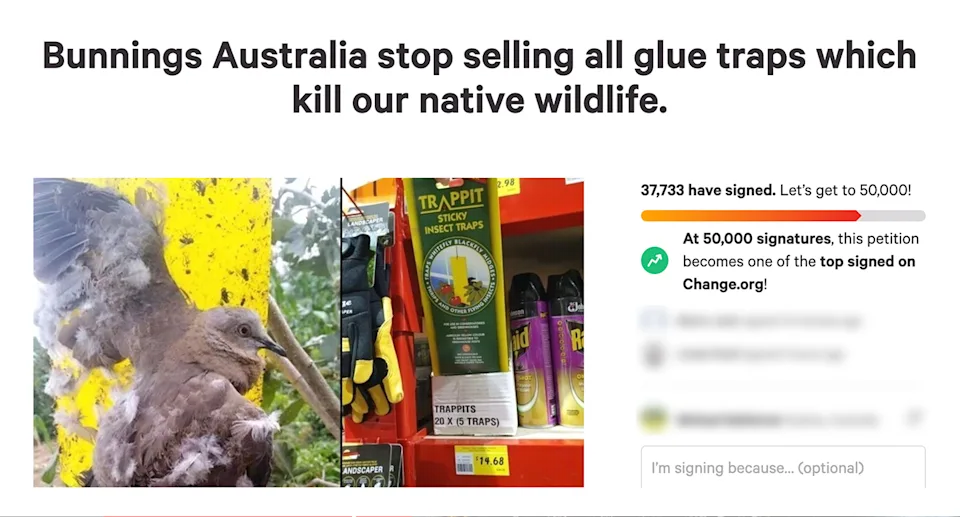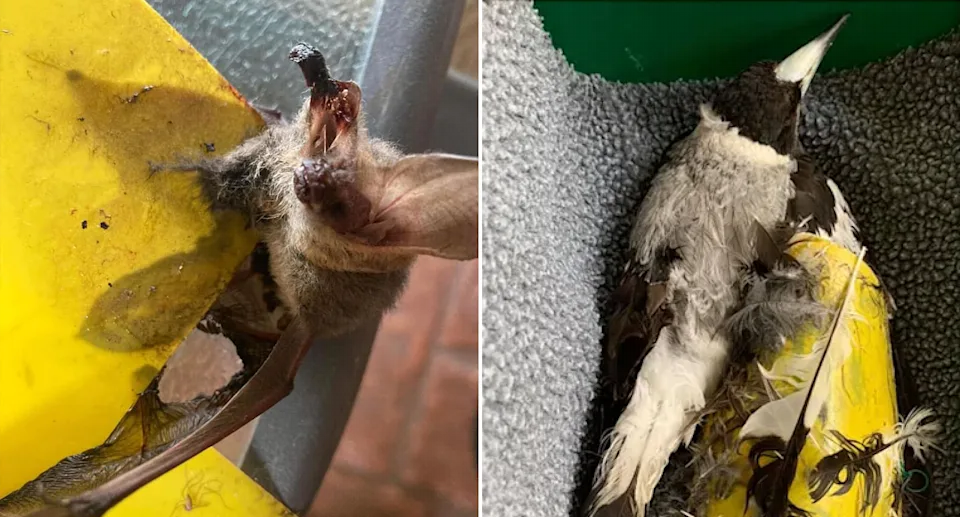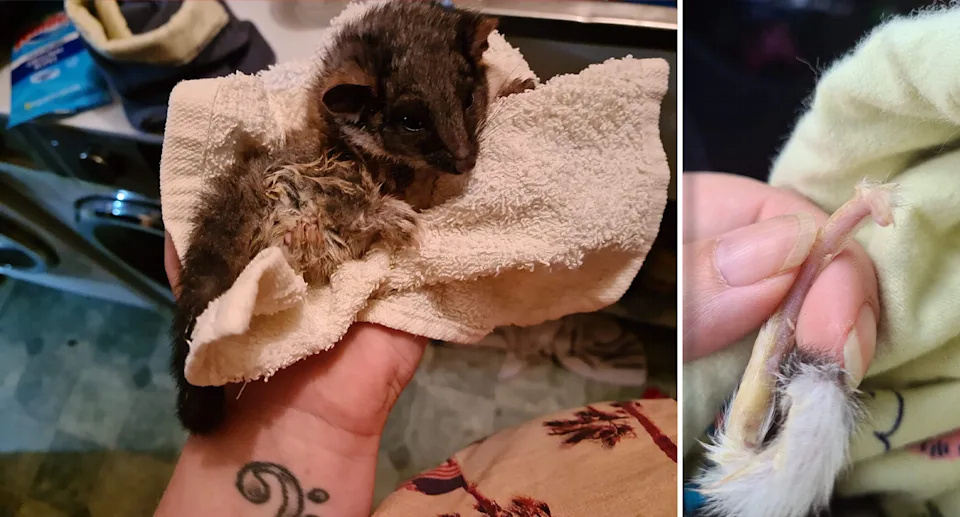Bunnings and other retailers face scrutiny from animal advocates over the continuous sale of glue traps despite numerous petitions to stop them
By
- Replies 16
Warning: The following photos may contain graphic imagery.
The issue of glue traps has been gaining traction in Australia in recent months, as animal rights advocates push retailers to stop selling them.
There is growing pressure on retailers, such as Bunnings, to stop selling glue traps, with a petition calling for their withdrawal receiving close to 38,000 signatures.
Glue traps are devices that are coated in a sticky substance, designed to catch rodents and other small animals. However, they often end up trapping other creatures, including birds, lizards, and even snakes.

The petition to stop the selling of glue traps has received almost 38,000 signatures. Credit: Change.org.
The petition read: "Glue traps cause horrific pain and suffering to any animal that comes in contact with them."
"It can be days before the creature succumbs to death via dehydration and starvation."
The petition, which was started by wildlife advocate Cat Coake and was posted on Change.org earlier this year, was said to be the sixth-biggest petition that has been started this year.
“We’re proud to support Cat as she uses the Change.org platform to help protect native animals,” said Change.org Australia director Nic Holas.
Mr Holas also expressed his hopes that big retailers, such as Bunnings and eBay, take the calls into consideration and stop the selling of glue traps.
Ms Coake, who called for supporters to send in evidence of the glue traps' impact three weeks ago, said that she receives an image showing wildlife caught in glue traps almost every day.
The glue traps in which the animals were found look almost identical, so it can be hard to identify which retailer sold them.
Among the species found in the traps include the Boobook owl, blue-tongue lizard, baby ringtail possum and a red-bellied black snake.
One heartbreaking image even shows a small bat whose wing had been ripped off by an insect glue trap.

The glue traps where the animals were found look almost identical, so it can be hard to identify which retailer sold them. Credit: Salina Giovenco-Ellem / Point Cook Wildlife Care Inc.
Bunnings general manager of merchandise Adrian Pearce confirmed that while the company is aware of the petition, there is a "range of views" to be considered regarding the sale of the item.
He quipped: “We continue to work with our suppliers and the regulatory bodies to ensure we are well-informed on these products.”
“We are working with our suppliers to include additional information on packaging to make it even more clear for customers how to correctly use the products, and we are aiming to roll this out before the end of the year.”
It should be noted that while the retailer is currently not selling rodent targeting traps from their stores, it still retails insect glue traps.
Animal rescuers reiterate that all types of glue traps have the potential to harm native wildlife.
Bats and birds are particularly vulnerable to glue traps, as they often mistake the sticky substance for a food source. Once caught, it can be difficult for these animals to free themselves, leading to injuries or even death.

Regardless of type, glue traps have the potential to harm native wildlife. Credit: Stefanie Taylor.
Meanwhile, both eBay and Amazon confirmed that they have taken steps to remove glue traps from their platforms following criticism from animal welfare advocates.
An eBay representative said that the company has made adjustments to its website, claiming that certain filters were put in place to block shoppers from viewing its online store's expansive range of glue traps.
However, a quick search of their site reveals there are still numerous listings of both insect and rodent varieties.
Amazon, on the other hand, said that they are working closely with their US sellers to "close a loophole" on exporting the traps to the country.
More information on this move remains unclear.
Should major retailers stop selling glue traps? Share your thoughts with us in the comments below. Also, for those who are looking to sign the petition, you may pledge your support here.
The issue of glue traps has been gaining traction in Australia in recent months, as animal rights advocates push retailers to stop selling them.
There is growing pressure on retailers, such as Bunnings, to stop selling glue traps, with a petition calling for their withdrawal receiving close to 38,000 signatures.
Glue traps are devices that are coated in a sticky substance, designed to catch rodents and other small animals. However, they often end up trapping other creatures, including birds, lizards, and even snakes.
The petition to stop the selling of glue traps has received almost 38,000 signatures. Credit: Change.org.
The petition read: "Glue traps cause horrific pain and suffering to any animal that comes in contact with them."
"It can be days before the creature succumbs to death via dehydration and starvation."
The petition, which was started by wildlife advocate Cat Coake and was posted on Change.org earlier this year, was said to be the sixth-biggest petition that has been started this year.
“We’re proud to support Cat as she uses the Change.org platform to help protect native animals,” said Change.org Australia director Nic Holas.
Mr Holas also expressed his hopes that big retailers, such as Bunnings and eBay, take the calls into consideration and stop the selling of glue traps.
Ms Coake, who called for supporters to send in evidence of the glue traps' impact three weeks ago, said that she receives an image showing wildlife caught in glue traps almost every day.
The glue traps in which the animals were found look almost identical, so it can be hard to identify which retailer sold them.
Among the species found in the traps include the Boobook owl, blue-tongue lizard, baby ringtail possum and a red-bellied black snake.
One heartbreaking image even shows a small bat whose wing had been ripped off by an insect glue trap.
The glue traps where the animals were found look almost identical, so it can be hard to identify which retailer sold them. Credit: Salina Giovenco-Ellem / Point Cook Wildlife Care Inc.
Bunnings general manager of merchandise Adrian Pearce confirmed that while the company is aware of the petition, there is a "range of views" to be considered regarding the sale of the item.
He quipped: “We continue to work with our suppliers and the regulatory bodies to ensure we are well-informed on these products.”
“We are working with our suppliers to include additional information on packaging to make it even more clear for customers how to correctly use the products, and we are aiming to roll this out before the end of the year.”
It should be noted that while the retailer is currently not selling rodent targeting traps from their stores, it still retails insect glue traps.
Animal rescuers reiterate that all types of glue traps have the potential to harm native wildlife.
Bats and birds are particularly vulnerable to glue traps, as they often mistake the sticky substance for a food source. Once caught, it can be difficult for these animals to free themselves, leading to injuries or even death.
Regardless of type, glue traps have the potential to harm native wildlife. Credit: Stefanie Taylor.
Meanwhile, both eBay and Amazon confirmed that they have taken steps to remove glue traps from their platforms following criticism from animal welfare advocates.
An eBay representative said that the company has made adjustments to its website, claiming that certain filters were put in place to block shoppers from viewing its online store's expansive range of glue traps.
However, a quick search of their site reveals there are still numerous listings of both insect and rodent varieties.
Amazon, on the other hand, said that they are working closely with their US sellers to "close a loophole" on exporting the traps to the country.
More information on this move remains unclear.
Should major retailers stop selling glue traps? Share your thoughts with us in the comments below. Also, for those who are looking to sign the petition, you may pledge your support here.







